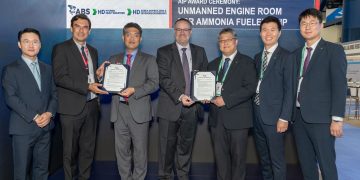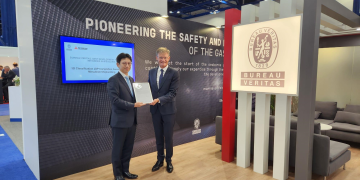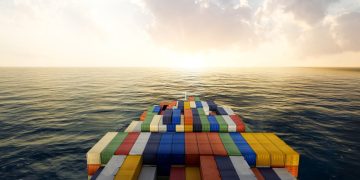According to World Shipping Council, International Maritime Organisation, has set a target of net-zero carbon emissions by 2050 for the industry, and now needs to develop climate regulations by 2025 that make it possible to reach that target.
A core challenge is how to craft a global greenhouse gas pricing regulation that can bridge the price gap between the cleanest fuels and fossil fuels, driving investments in green fuels, without imposing an outsized cost on the global economy. As member nations prepare for negotiations at the IMO MEPC 81 in March, the World Shipping Council is bringing to the table a proposal on greenhouse gas pricing that can help solve this conundrum.
WSC highlights that they see the catastrophic effects of climate change every day, and as a significant emitter of greenhouse gases, the shipping industry must do its part and decarbonise by 2050. Container and vehicle carriers are building and already operating vessels that can run on the greenest fuels, but those fuels cost 3 to 4 times more, and the supply of green fuels is only a fraction of what is needed. Global climate regulations are necessary to make it possible for carriers to operate on green fuels, and to incentivize fuel and energy providers to invest in new production capacity.
The WSC Green Balance Mechanism outlines a new approach to greenhouse gas pricing which makes it possible to close the price gap between fossil fuels and green fuels, at the lowest possible overall cost:
-
Through the Green Balance Mechanism, fees are taken from fossil fuels and allocated to green fuels used, so that the average cost of fuel is equal.
-
The greater the greenhouse gas emission reductions a fuel delivers – on a well-to-wake lifecycle basis – the greater the financial allocation received.
-
The monies collected in any given year is determined by the amount of green fuels used, allowing for a relatively low fee at the start of the transition.
-
The minimum fee necessary to offset the price differential in a given year is collected and allocated to ships using green fuels that meet a specific greenhouse gas threshold. This ensures that green fuels can be produced and used and does so with the least possible cost to transportation.
-
The emission reductions required for a fuel to receive a price-balancing allocation are linked to IMO decarbonisation requirements, increasing in stringency toward the 2050 net-zero goal.
-
The Green Balance Mechanism is adaptable and fully integrated with a greenhouse gas fuel-intensity standard. It can be used as a targeted greenhouse gas pricing mechanism, or a possible addition to an integrated measure.
-
Other fees can be added to raise funds for climate mitigation initiatives and Research, Development & Demonstration projects, to provide a just and equitable transition.
The Green Balance Mechanism is adaptable and fully integrated with a greenhouse gas fuel-intensity standard. It can be used as a targeted greenhouse gas pricing mechanism, or a possible addition to an integrated measure.
Other fees can be added to raise funds for climate mitigation initiatives and Research, Development & Demonstration projects, to provide a just and equitable transition. The Green Balance Mechanism makes it economically rational and attractive for both ship owners and energy providers to invest in fuels and technologies that deliver deep greenhouse gas reductions from the day the regulation takes effect. Existing and soon-to-be delivered dual-fuel ships will be able to operate on the cleanest fuels, rather than having to wait years before economically viable fuels are available. This allows production of the cleanest fuels to grow more quickly, accelerating economies of scale that will push down the cost of green fuels, getting us to zero in the most economically efficient way possible.
Liner carriers are committed to decarbonising shipping and eager to support the development of effective and timely global climate regulations through the IMO. Switching from fossil fuels to green energy sources for the engine of global trade will take time and require massive private and public investments. It is our shared responsibility to make sure we meet the needs of our climate in a way that minimises the cost for the global economy.
..says John Butler, President & CEO of World Shipping Council.
Decarbonizing shipping will not be achieved by a single company, it will take the efforts and involvement of all the stakeholders. The CMA CGM Group has already invested more than $15 billion in decarbonizing its fleet, which will enable us to have 120 vessels capable of running on alternative fuels by 2028. As a next step we need to act collectively and to promote a level playing field at the global level for our industry.
..says Rodolphe Saadé, Chairman & CEO of CMA-CGM.
K.H. Wu, CEO of Evergreen says that collective action is vital for the liner shipping industry in striving toward decarbonization. With 24 dual-fuel methanol vessels on order, they will further join forces with like-minded partners toward greening the future of shipping. It is essential to have a new approach to greenhouse gas pricing that would drive demand for cleaner fuels from the start of the transition.
Climate change is a defining issue of our time, and HMM shares a sustainability vision of the global shipping industry. To achieve net zero emissions by 2050, HMM has focused on enhancing carbon footprint visibility, ordering methanol-powered vessels, and exploring clean energy sources, including biofuels, methanol, and ammonia. We believe the Green Balance Mechanism proposed by WSC is expected to accelerate the industry’s broader transition to carbon neutrality.
…says Kyung Bae Kim, CEO of HMM.
Furthermore, according to Vincent Clerc, CEO of Maersk, the year 2050 might seem distant, yet in the context of their climate ambitions, it is practically upon them. The IMO is at a crossroad that will determine their ability to decarbonise the shipping industry and achieve net-zero emissions. To get there, they need mechanisms that can bridge the transition from fossil-based to green fuel, and they call on IMO Member States to take decisive actions that reward early adopters by compensating truly green vessels corresponding to their emission’s reductions. This approach is critical for accelerating the retirement of fossil-fuelled vessels.




































































